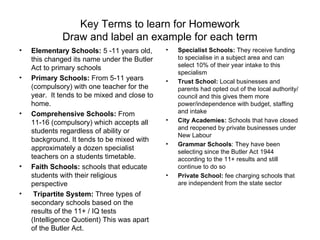Summer tasks for september 2011
- 1. SOCIOLOGY SUMMER TASKS FOR SEPTEMBER 2011 1. Make a collage of all the different family types you can get. 2. Prepare for a debate on is there a ‘right’ type of family? 3. Think of 1 example in the media of each family type you’ve listed
- 2. SOCIOLOGY SUMMER TASKS FOR SEPTEMBER 2011 1. Make a collage of all the different schools types you can get. 2. Prepare for a debate on is there a ‘right’ type of schools? 3. Think of 1 example in London of each school type you’ve listed
- 3. Key Terms to learn for Homework Draw and label an example for each term Nuclear family: a family that has a father, mother and their children Reconstituted family: a family living together with step parents / step brothers/sisters Lone Parent family: One adult Raising a child/children (not called single due to may have partner that lives elsewhere) Neo-conventional Families: A nuclear family with partners working Cohabitating: partners living together without being married Cereal Packet Family: The traditional image of a family with male and female roles Same Sex Families: A couple that live together that are the same sex Singletons: a person living on their own Communal household: People that rents a room and all contribute to bills Extended family: a nuclear family with more e.g. grandparents, (vertical) aunts & uncles (horizontal) Finch & Mason ties are important Beanpole family: A small nuclear family that is in regular contact with the grandparents that may even be the childminder
- 4. Key Terms to learn for Homework Draw and label an example for each term Elementary Schools: 5 -11 years old, this changed its name under the Butler Act to primary schools Primary Schools: From 5-11 years (compulsory) with one teacher for the year. It tends to be mixed and close to home. Comprehensive Schools: From 11-16 (compulsory) which accepts all students regardless of ability or background. It tends to be mixed with approximately a dozen specialist teachers on a students timetable. Faith Schools: schools that educate students with their religious perspective Tripartite System: Three types of secondary schools based on the results of the 11+ / IQ tests (Intelligence Quotient) This was apart of the Butler Act. Specialist Schools: They receive funding to specialise in a subject area and can select 10% of their year intake to this specialism Trust School: Local businesses and parents had opted out of the local authority/council and this gives them more power/independence with budget, staffing and intake City Academies: Schools that have closed and reopened by private businesses under New Labour Grammar Schools : They have been selecting since the Butler Act 1944 according to the 11+ results and still continue to do so Private School: fee charging schools that are independent from the state sector




